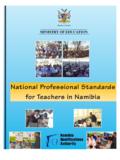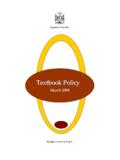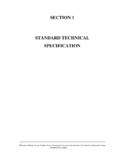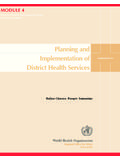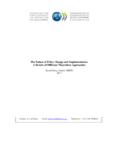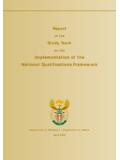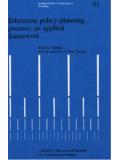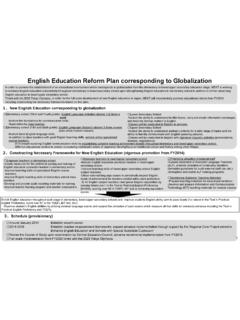Transcription of MINISTRY OF EDUCATION REPUBLIC OF NAMIBIA TEXTBOOK …
1 1 MINISTRY OF EDUCATION REPUBLIC OF NAMIBIA TEXTBOOK POLICY implementation PLAN 07 February 2011 2 Table of Contents A. SUMMARY .. 3 B. POLICY DEFINITION AND EVALUATION .. 5 Policy Outcomes .. 5 Project Beneficiaries .. 5 Evaluation Methodology .. 5 C. GOVERNANCE .. 6 D. DELIVERABLES .. 6 E. Establish Supply Chain Management Unit (SCMU) .. 9 Background .. 9 SCMU Terms of Reference .. 9 Key Tasks ..10 F. Establish TEXTBOOK Data Management and 12 G. reform Policies on Curriculum Review Cycle and TEXTBOOK Selection .. 14 H. Tender and Contract for TEXTBOOK Purchase and Distribution for 2012 2017`: .. 16 Background ..16 Key Tasks.
2 16 I. Establish Regional Redistribution Systems: .. 16 Background ..16 Key Tasks ..16 J. Phase in Plan: .. 17 Background ..17 Key Tasks ..17 2012 TEXTBOOK Procurement Cycle ..17 K. RESOURCES .. 19 Budget ..19 Non-financial Resources ..26 Procurement Plan ..26 L. Risk and Stakeholder Management .. 26 M. Quality Assurance .. 28 Annex 1: Priority Policy Strategies of the 2008 TEXTBOOK Policy .. 29 3 A. SUMMARY This TEXTBOOK Policy implementation Plan1 ( TPIP ) defines the MINISTRY of EDUCATION s ( MoE ) plan for implementing the 2008 TEXTBOOK Policy that was approved the Cabinet on March 18, 2008. The 2008 TEXTBOOK Policy is at broad strategic level and itself envisioned a subsequent detailed policy implementation planning stage , which is the purpose of this document.
3 The following is a summary of the main tasks contained in the body of the plan that the MOE will undertake in order to implement the 2008 TEXTBOOK Policy2: 1. Establish Supply Chain Management Unit: The Supply Chain Management Unit will be formally established with dedicated staff who are formally mandated with the planning, coordination, supervision and monitoring of TEXTBOOK Procurement. 2. Establish TEXTBOOK Capitation Allowance: Use of the latest EDUCATION Management Information System (EMIS) 15-day school survey enrolment data as well as the annual census to calculate the textbooks capitation allowance for schools based on an agreed transparent standardised formula and ring fenced.
4 Ring Fenced means that the budget for LSM should be its own line item and set in a way that does not allow its use for stationary or other expenses. 3. Issue Terms of Reference for the NTB: The new ToRs should limit the role of the NTB to that of consulting stakeholders in regards to LSM development and provision, but not give the NTB any authority to govern, manage, set policy or in any way represent the GRN. 4. Revise the Policies on Curriculum reform and TEXTBOOK Evaluation: Develop and politically commit to a more predictable curriculum review/ TEXTBOOK publishing cycle. Revise TEXTBOOK tender procedures, evaluation methodology/criteria, documentation.
5 Develop a separate evaluation process for specialized materials that are not produced specially for NAMIBIA . Outlaw unsolicited submissions by publishers; Use paid panels of evaluators in one place at the same time working on established evaluation criteria; 1 This TPIP is required per the Compact signed between GRN and US government as well as the Implementing Partner Agreement ( IPA ) signed between MCA NAMIBIA and MOE on December 14, 2009. Both the Compact and the IPA require implementation of this TPIP prior to the release of the remaining Compact funding for the procurement of textbooks. 2 This report draws on the findings and recommendation of the 13 September 2010 report by Vincent Bontoux and the TEXTBOOK Procurement Baseline Study (GOPA Consultants/MCC, May 2010).
6 4 Develop competitive evaluation and selection system based both quality and cost; Develop management and evaluator training modules to accompany new evaluation and selection system; Following the acceptance of a title into the LSM catalogue publishers should be legally bound to not increase prices, and to guarantee availability of titles for the full period of the tender (5 years); conversely the MOE should guarantee that there will no more than 3 titles for a grade subject and that the title will remain on the catalogue until the next curriculum review and tender process which should be a minimum of years amounting to half the duration of the curriculum cycle.
7 5. Tender and Contract for TEXTBOOK Distribution for 2012 2017: A more predictable and streamlined LSM ordering, processing, and delivery system should be made available by: Designing and enforcing better LSM Distribution contracts Require Distributors to provide order data in electronic format to the SCMU. Defining how the tender will work in the context of decentralization. Publishing and enforcing an annual schedule for TEXTBOOK ordering and delivery, meaning that for orders placed on-time by schools, distributors should have a maximum time period for delivery to schools, with associated penalties for non-compliance.
8 Designing and delivering a training program on LSM tendering and ordering to all 13 regions prior to issuing of regional LSM tenders. Distribution contracts based on level of effort towards delivery and not on value of book delivered. 6. Establish Regional Redistribution Systems: Establish incentives and policies to ensure that schools do not hoard books in their storage rooms, but rather provide them to students or send them back regional centres for redistribution to other schools This is also needed to phase-in synchronized ordering. 7. Phase in Plan: Define interim transition steps needed to transition into the full implementation of the proposed reforms, including: rationalizing/freezing the LSM catalogue and major LSM non-bid procurements and informing stakeholders of the TPIP.
9 Review and redesign of the LSM evaluation system for LSM Training of Evaluators on the new evaluation system Piloting the new evaluation system by conducting an evaluation of lower primary phase publishing bids. 8. Resources: MCA-N will provide resources to procure Technical Advisory Services to support the suggested reforms to the LSM provision system, while the MoE will 5 implement the necessary structural reforms to support the implementation of the suggested reforms. 9. Risk and Stakeholder Management: The implementation of the suggested reforms includes several stakeholders which naturally pose some risks, thus it is essential that all foreseeable risk are considered and mitigated appropriately.
10 10. Quality Assurance: The reforms suggested in this implementation plan primarily involve two major directorates of the MoE (NIED and PQA), with the DNEA, the National Assessment, Examination & Certification Board, and every regional EDUCATION directorate playing vital supporting roles, thus it is of prime importance to monitor the deliverables and outcomes from the various interventions being driven by the various directorates. B. POLICY DEFINITION AND EVALUATION Policy Outcomes The major mission of the TEXTBOOK Policy is to plan and implement an integrated, sustainable and coordinated learning support material (LSM) supply chain (from curriculum design to LSM delivery and usage) that will provide the best value, curriculum relevant textbooks and other LSM in an equitable way to all learners and teachers.



